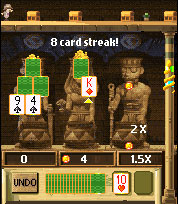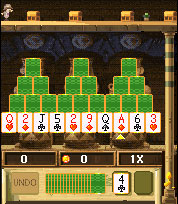Tri-Peaks Solitaire, a game that gained tremendous popularity when packaged with the Windows Entertainment Pack in the early 1990s, is one of the latest offerings from EA's mobile Pogo program. Although it has been playable on the PC for a while, mobile customers can now jump into the fray with the PC gamers and compete for cash prizes, by winning virtual tokens in-game. Pogo's version of Tri-Peaks Solitaire is just as good as the PC game, and it's portable to boot.

The setup of the game is 18 face-down cards forming three pyramids, with 10 face-up cards placed at their base. As you remove the face-up cards from the bottom of the pyramids, you can flip over any face-down card that you free up. The remaining 24 cards in the deck are placed in a pile that you can flip over, one card face-up at a time. The goal of the game is to place the cards from the pyramids on top of this face-up card, which you can do if they're consecutively one card lower or higher. You can keep going until there are no more moves, and then you'll flip another card onto the pile and try again. If you run out of the deck before you clear all three pyramids, then you've "lost" the game. In Tri-Peaks Solitaire for mobile, what this means is that you don't get as many tokens for use on Pogo.com, even though you will keep all the tokens you earned along the way.
The token reward from Tri-Peaks Solitaire is pretty significant, especially given how addictive the game is. Long streaks of placing cards will also be rewarded with bonus multipliers for even higher token balances. We found it easy to rack up a number of tokens quickly while playing Tri-Peaks. What this amounts to is more raffle tickets over at Pogo.com. A few minutes of play will give you around a hundred tokens, equaling one raffle ticket. You can then submit your raffle tickets to the daily prize drawing of $50, the weekly drawing of $250, or the monthly drawing for $1,000.
The added dynamic to Pogo's Tri-Peaks from the regular card game is a minigame on the top of the screen. This features a miniature archaeologist who needs to bypass a few traps to reach a treasure chest. With each game that you win, he makes it past one more trap. Along the way, he can unlock bonuses, such as extra tokens or the wild card, which will allow you to remove any one card from the pyramid for free. If you lose a game, he won't go back to the beginning, so you need to simply win five games in one sitting to reach the final treasure chest, which almost always results in a hefty sum of tokens.
The game's appearance is simple, but it's good enough. You are treated to little animations of your archaeologist between games, and it's easy to see and play the game on the LG VX6100. The sound effects reflect the movement of the cards and the jingle of coins falling into your token total.

Rewards aside, Pogo games are only as good as they are fun. In the case of Tri-Peaks, you'll probably be addicted to its simple yet pervasive gameplay, but maybe not long enough to win anything. If you'd like to gamble away some of your free time, this game is a very good way to do so.